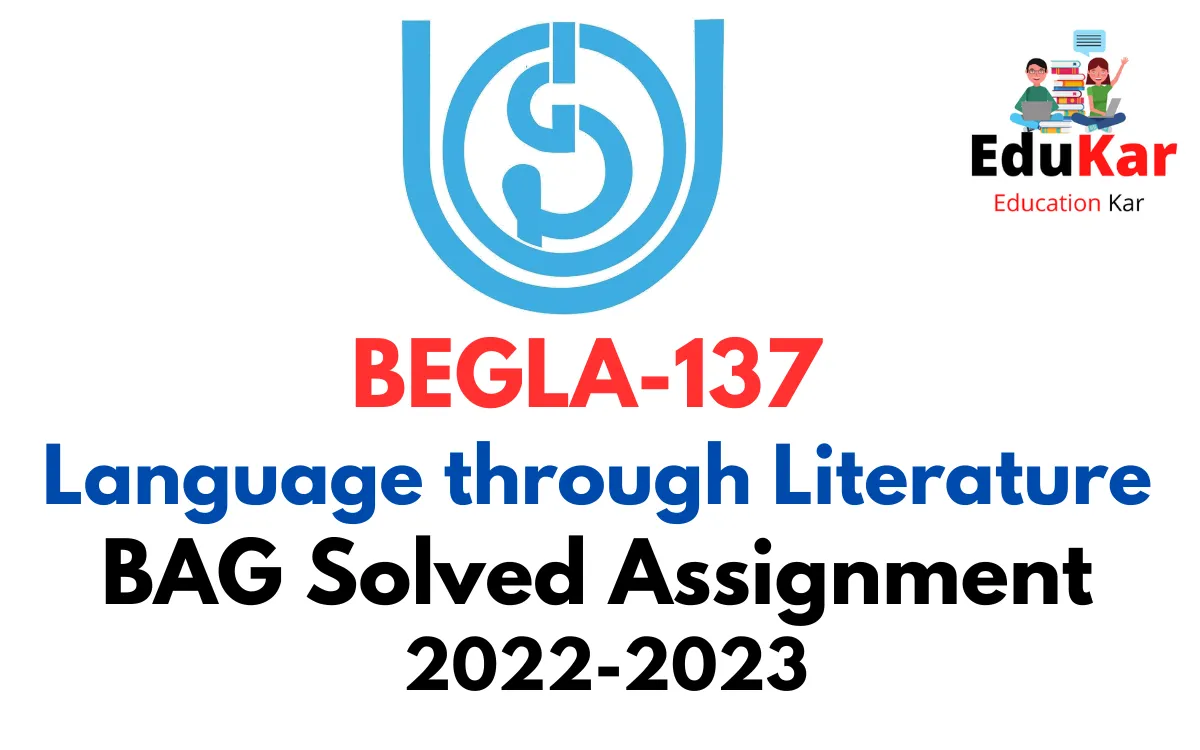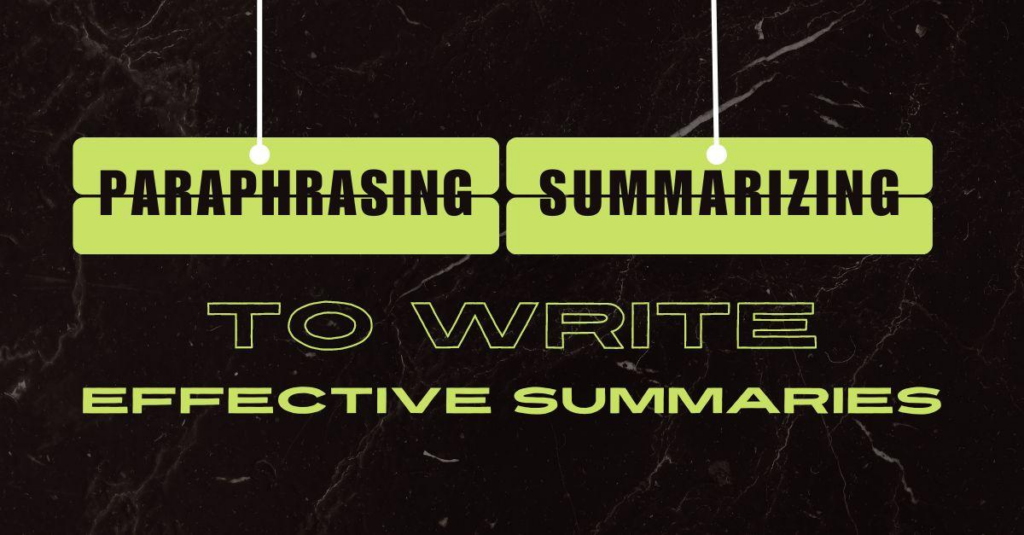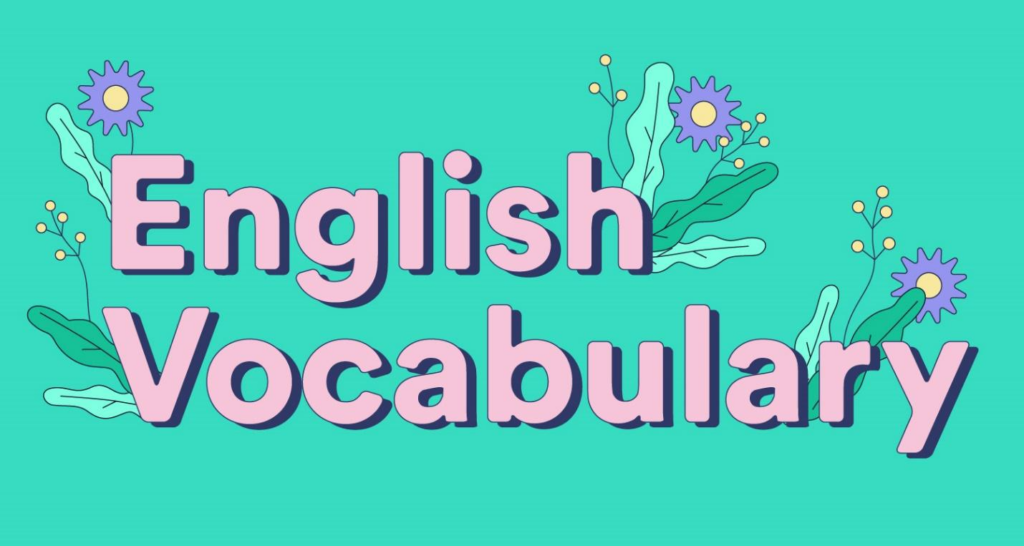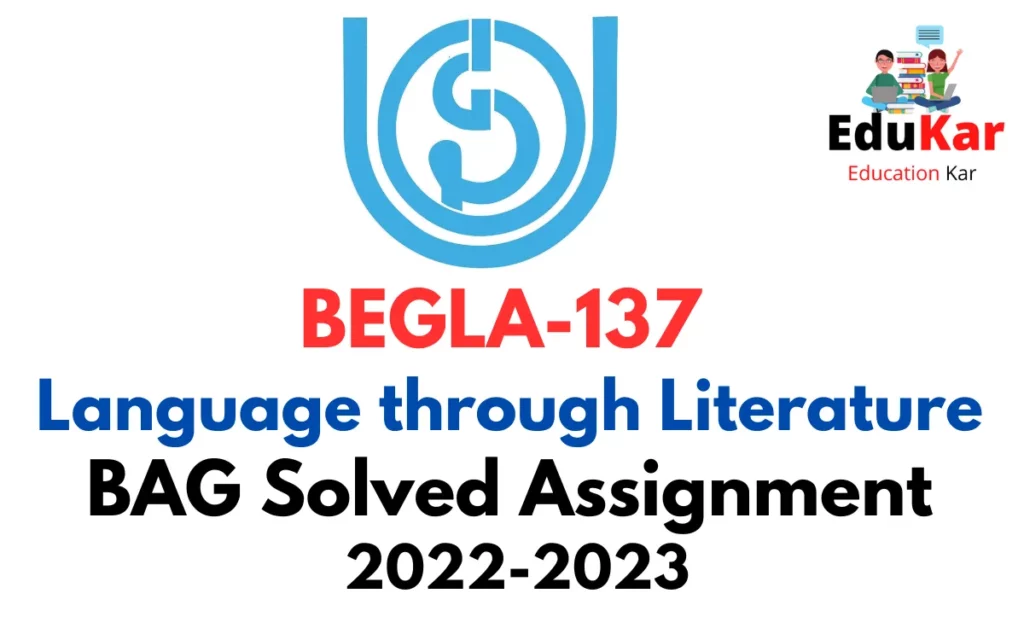
| Title | BEGLA-137: IGNOU BAG Solved Assignment 2022-2023 |
| University | IGNOU |
| Degree | Bachelor Degree Programme |
| Course Code | BEGLA-137 |
| Course Name | Language through Literature |
| Programme Name | Bachelor of Arts (General) |
| Programme Code | BAG |
| Total Marks | 100 |
| Year | 2022-2023 |
| Language | English |
| Assignment PDF | Click Here |
| Last Date for Submission of Assignment: | For June Examination: 31st April For December Examination: 30th September |
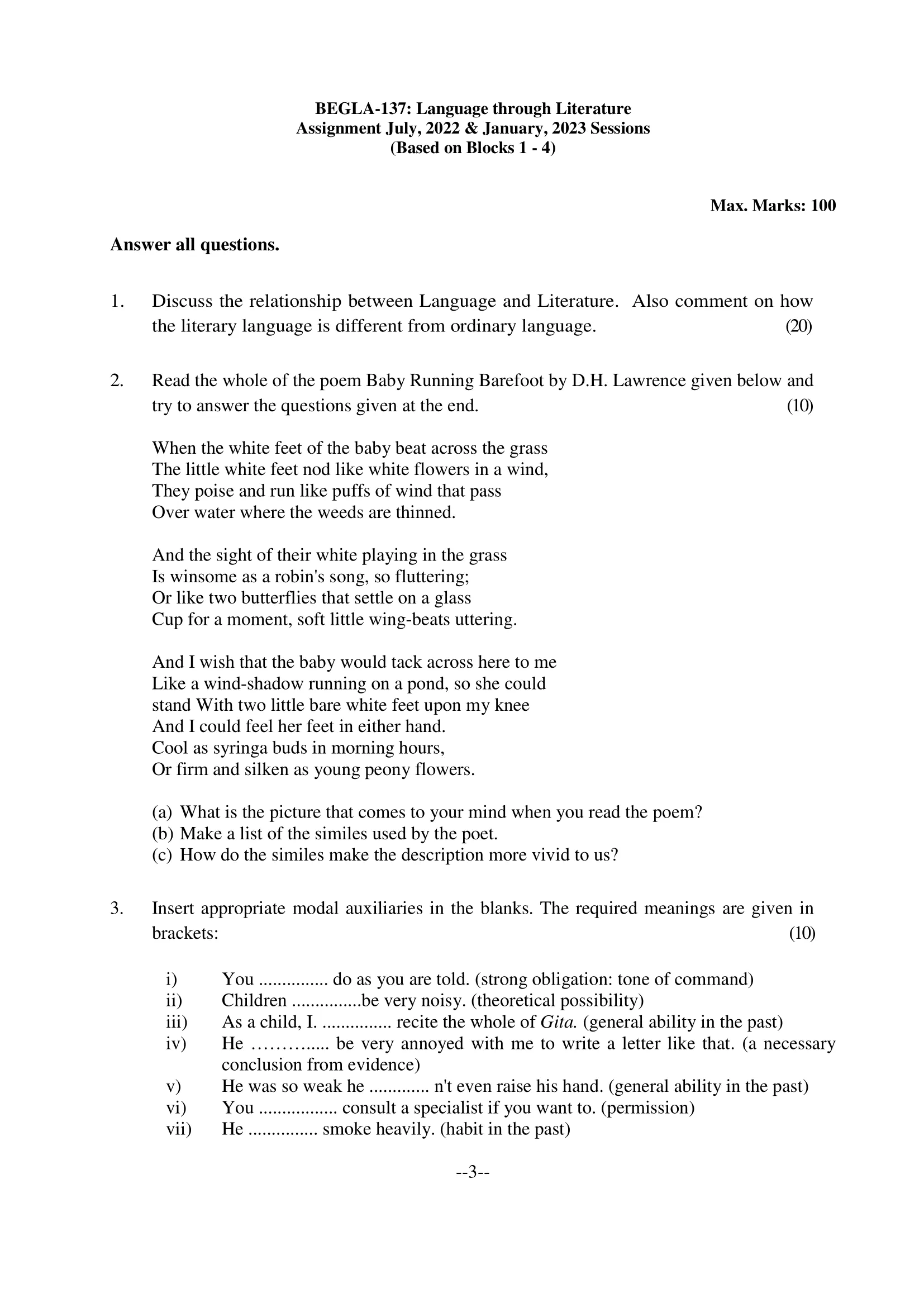
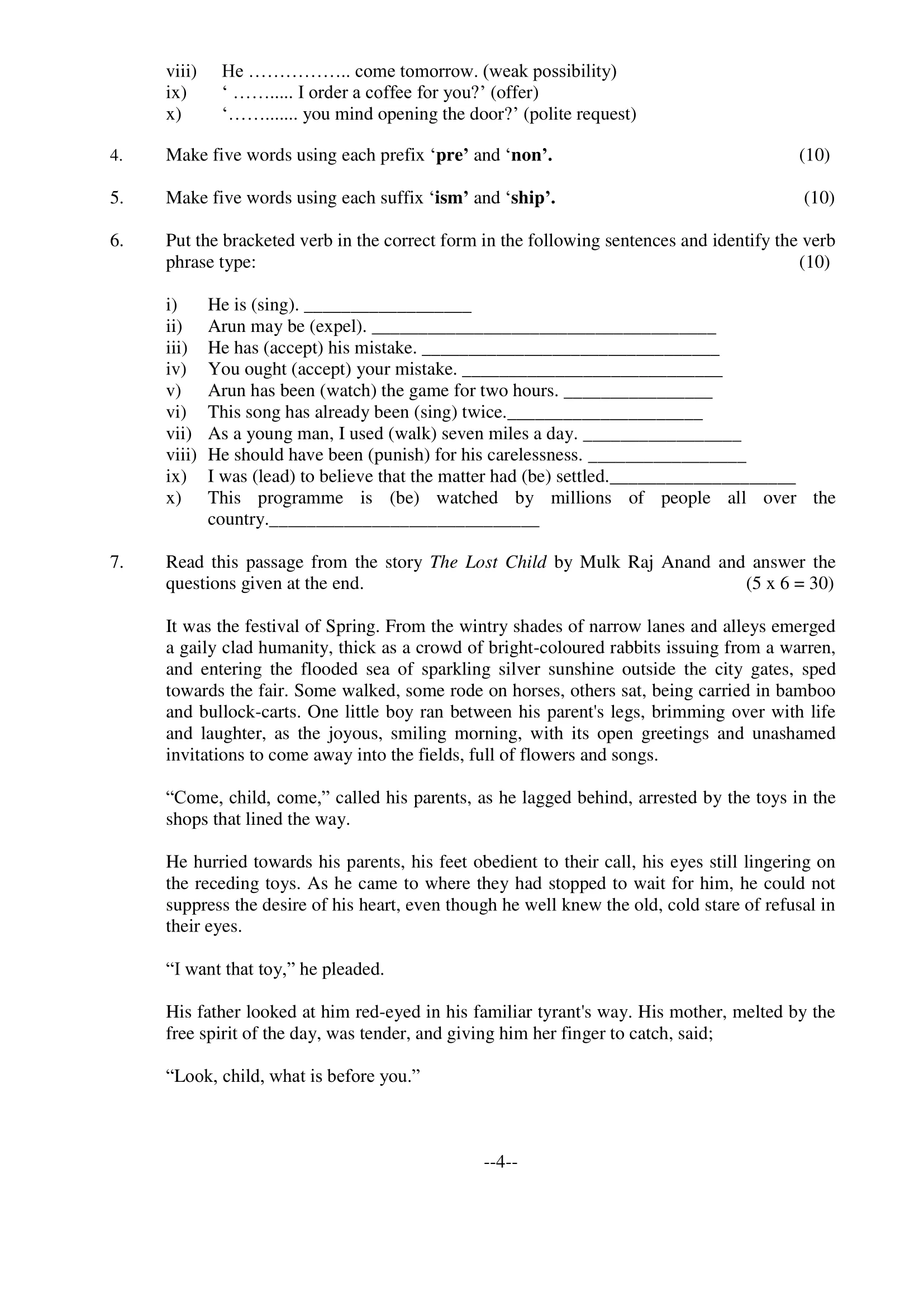
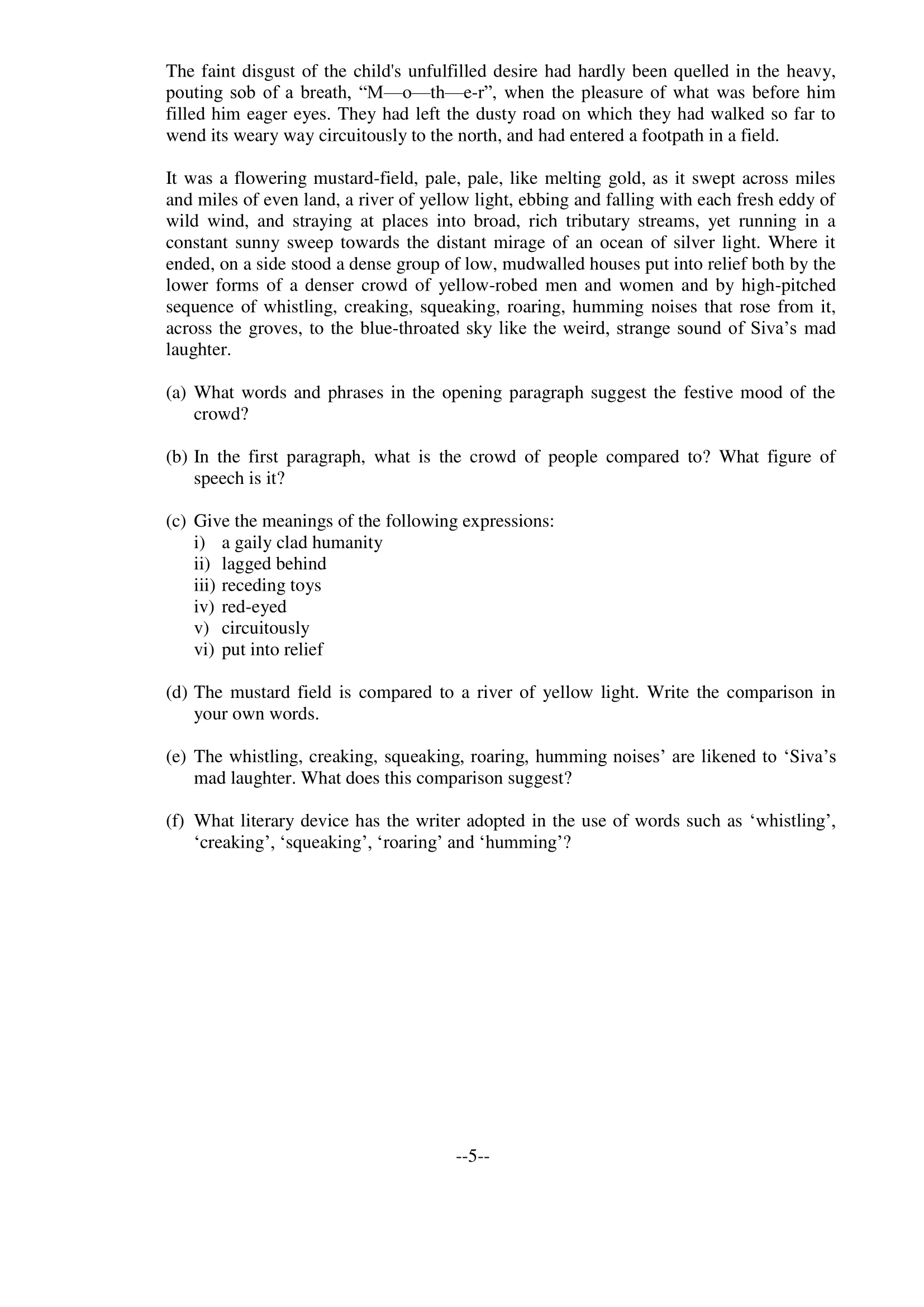
1. Discuss the relationship between Language and Literature. Also comment on how the literary language is different from ordinary language.
Ans: Language and literature have an intimate relationship as literature is a form of artistic expression that uses language as its medium. Language is the raw material for literature, and literature depends on language to create its effects. Literature utilizes language to convey meaning beyond the literal, to express emotions, thoughts, and feelings, and to create an aesthetic experience for the reader.
The literary language is different from ordinary language in several ways. Firstly, literary language tends to be more formal and sophisticated than ordinary language. It is often characterized by the use of figurative language, metaphors, and symbols that are not typically used in everyday speech. The language of literature is often more complex, nuanced, and subtle than ordinary language, requiring the reader to engage more deeply with the text to fully understand it.
Secondly, the literary language is often more focused on aesthetics and emotional impact than conveying information. The language of literature is designed to create a certain mood or atmosphere and to evoke specific emotions in the reader. For example, poetry often uses sound, rhythm, and meter to create a musical effect that enhances the emotional impact of the words.
Lastly, the literary language is often more creative and imaginative than ordinary language. Literature allows for the creation of imaginary worlds, characters, and events that do not exist in reality. Authors often use literary devices such as irony, allusion, and foreshadowing to create a layered and complex narrative that requires the reader to think critically and engage with the text on multiple levels.
2. Read the whole of the poem Baby Running Barefoot by D.H. Lawrence given below and try to answer the questions given at the end.
When the white feet of the baby beat across the grass
The little white feet nod like white flowers in a wind,
They poise and run like puffs of wind that pass
Over water where the weeds are thinned.And the sight of their white playing in the grass
Is winsome as a robin’s song, so fluttering;
Or like two butterflies that settle on a glass
Cup for a moment, soft little wing-beats uttering.And I wish that the baby would tack across here to me
Like a wind-shadow running on a pond, so she could
stand With two little bare white feet upon my knee
And I could feel her feet in either hand.
Cool as syringa buds in morning hours,
Or firm and silken as young peony flowers.
(a) What is the picture that comes to your mind when you read the poem?
Ans. The picture that comes to mind when reading the poem is that of a baby running barefoot through the grass. The poet describes the baby’s little white feet as nodding like white flowers in the wind and running like puffs of wind over water. The image is one of innocence, joy, and freedom. The baby’s playing in the grass is compared to a robin’s song or butterflies settling on a glass. The poet expresses a desire to have the baby come to him so that he can hold her feet in his hands and feel their softness and coolness like syringa buds in the morning or young peony flowers.
(b) Make a list of the similes used by the poet.
Ans. The similes used by the poet in the poem “Baby Running Barefoot” are:
- “The little white feet nod like white flowers in a wind”
- “They poise and run like puffs of wind that pass over water where the weeds are thinned”
- “Winsome as a robin’s song, so fluttering”
- “Like two butterflies that settle on a glass cup for a moment, soft little wing-beats uttering”
- “Cool as syringa buds in morning hours”
- “Or firm and silken as young peony flowers”
(c) How do the similes make the description more vivid to us?
Ans. The similes used in the poem “Baby Running Barefoot” make the description more vivid by comparing the baby’s little white feet to various objects and phenomena that readers can easily visualize and relate to. The similes create a series of images that help readers to see and feel what the poet is describing. For example, the comparison of the baby’s feet nodding like white flowers in a wind creates an image of the baby’s feet moving gently and rhythmically, like flowers swaying in the breeze. Similarly, the comparison of the baby’s feet running like puffs of wind passing over water helps to convey the speed and lightness of the baby’s movements. The similes also create a sense of delicacy and beauty, as the baby’s feet are compared to butterflies settling on a glass cup or the softness and coolness of syringa buds or young peony flowers.
3. Insert appropriate modal auxiliaries in the blanks. The required meanings are given in brackets:
i) You …………… do as you are told. (strong obligation: tone of command)
Ans: You must do as you are told.
ii) Children ……………be very noisy. (theoretical possibility)
Ans: Children could be very noisy.
iii) As a child, I. …………… recite the whole of Gita. (general ability in the past)
Ans: As a child, I could recite the whole of Gita.
iv) He ………….. be very annoyed with me to write a letter like that. (a necessary conclusion from evidence)
Ans: He must be very annoyed with me to write a letter like that.
v) He was so weak he …………. n’t even raise his hand. (general ability in the past)
Ans: He was so weak he couldn’t even raise his hand.
vi) You …………….. consult a specialist if you want to. (permission)
Ans: You may consult a specialist if you want to.
vii) He …………… smoke heavily. (habit in the past)
Ans: He used to smoke heavily.
viii) He …………….. come tomorrow. (weak possibility)
Ans: He might come tomorrow.
ix) ‘ ……….. I order a coffee for you?’ (offer)
Ans: “Shall I order a coffee for you?” (offer)
x) ‘…………. you mind opening the door?’ (polite request)
Ans: “Would you mind opening the door?” (polite request)
4. Make five words using each prefix ‘pre’ and ‘non’.
Ans: Words using the prefix ‘pre’:
- Precaution
- Precede
- Preconceived
- Prejudice
- Preschool
Words using the prefix ‘non’:
- Nonfiction
- Nonchalant
- Nonsense
- Nonstop
- Nonviolent
5. Make five words using each suffix ‘ism’ and ‘ship’.
Ans: Words using the suffix ‘ism’:
- Capitalism
- Feminism
- Atheism
- Buddhism
- Romanticism
Words using the suffix ‘ship’:
- Leadership
- Friendship
- Apprenticeship
- Scholarship
- Sportsmanship
6. Put the bracketed verb in the correct form in the following sentences and identify the verb phrase type:
i) He is (sing). ______
Ans: He is singing.
Verb phrase type: present continuous.
ii) Arun may be (expel). _________________________
Ans: Arun may be expelled.
Verb phrase type: modal verb (may) + base form of verb (be expelled).
iii) He has (accept) his mistake. ____________________
Ans: He has accepted his mistake.
Verb phrase type: present perfect.
iv) You ought (accept) your mistake. ________________
Ans: You ought to accept your mistake.
Verb phrase type: modal verb (ought) + base form of verb (to accept).
v) Arun has been (watch) the game for two hours. ____
Ans: Arun has been watching the game for two hours.
Verb phrase type: present perfect continuous.
vi) This song has already been (sing) twice._________
Ans: This song has already been sung twice.
Verb phrase type: present perfect passive.
vii) As a young man, I used (walk) seven miles a day. _____
Ans: As a young man, I used to walk seven miles a day.
Verb phrase type: used to + base form of verb (walk).
viii) He should have been (punish) for his carelessness. _____
Ans: He should have been punished for his carelessness.
Verb phrase type: modal verb (should have) + been + past participle (punished).
ix) I was (lead) to believe that the matter had (be) settled.________
Ans: I was led to believe that the matter had been settled.
Verb phrase type: past simple passive (was led) + past participle (to believe) + past participle passive (had been settled).
x) This programme is (be) watched by millions of people all over the
country._________________
Ans: This programme is being watched by millions of people all over the country.
Verb phrase type: present continuous passive.
Read this passage from the story The Lost Child by Mulk Raj Anand and answer the questions given at the end.
It was the festival of Spring. From the wintry shades of narrow lanes and alleys emerged a gaily clad humanity, thick as a crowd of bright-coloured rabbits issuing from a warren, and entering the flooded sea of sparkling silver sunshine outside the city gates, sped towards the fair. Some walked, some rode on horses, others sat, being carried in bamboo and bullock-carts. One little boy ran between his parent’s legs, brimming over with life and laughter, as the joyous, smiling morning, with its open greetings and unashamed invitations to come away into the fields, full of flowers and songs.
“Come, child, come,” called his parents, as he lagged behind, arrested by the toys in the shops that lined the way.
He hurried towards his parents, his feet obedient to their call, his eyes still lingering on the receding toys. As he came to where they had stopped to wait for him, he could not
suppress the desire of his heart, even though he well knew the old, cold stare of refusal in their eyes.“I want that toy,” he pleaded.
His father looked at him red-eyed in his familiar tyrant’s way. His mother, melted by the free spirit of the day, was tender, and giving him her finger to catch, said;
“Look, child, what is before you.”
The faint disgust of the child’s unfulfilled desire had hardly been quelled in the heavy, pouting sob of a breath, “M—o—th—e-r”, when the pleasure of what was before him filled him eager eyes. They had left the dusty road on which they had walked so far to wend its weary way circuitously to the north, and had entered a footpath in a field.
It was a flowering mustard-field, pale, pale, like melting gold, as it swept across miles and miles of even land, a river of yellow light, ebbing and falling with each fresh eddy of wild wind, and straying at places into broad, rich tributary streams, yet running in a constant sunny sweep towards the distant mirage of an ocean of silver light. Where it ended, on a side stood a dense group of low, mudwalled houses put into relief both by the lower forms of a denser crowd of yellow-robed men and women and by high-pitched sequence of whistling, creaking, squeaking, roaring, humming noises that rose from it, across the groves, to the blue-throated sky like the weird, strange sound of Siva’s mad laughter.
(a) What words and phrases in the opening paragraph suggest the festive mood of the crowd?
Ans: The words and phrases that suggest the festive mood of the crowd in the opening paragraph are “gaily clad humanity,” “bright-coloured rabbits,” “joyous, smiling morning,” “open greetings,” “unashamed invitations,” and “fields full of flowers and songs.”
(b) In the first paragraph, what is the crowd of people compared to? What figure of speech is it?
Ans: In the first paragraph, the crowd of people is compared to a “warren” of bright-colored rabbits emerging from narrow lanes and alleys. This is a simile, which is a figure of speech that compares two things using “like” or “as”.
(c) Give the meanings of the following expressions:
i) a gaily clad humanity
Ans: “a gaily clad humanity” means a crowd of people dressed in bright and colourful clothes, who appear happy and festive.
ii) lagged behind
Ans: “Lagged behind” means to fall behind in terms of progress or movement, to be slower than others, or to not keep up with a group that is moving forward.
iii) receding toys
Ans: “Receding toys” refers to the toys that the child saw earlier and is now moving away from. “Receding” means moving back or further away from a previous position.
iv) red-eyed
Ans: “Red-eyed” typically refers to someone whose eyes are red, often due to tiredness, crying, or irritation. In this context, it may suggest that the father is angry or upset.
v) circuitously
Ans: “circuitously” means taking a longer route or a roundabout way to reach a destination or goal.
vi) put into relief
Ans: “Put into relief” means to highlight or emphasize something by contrasting it with its surroundings or background. In the given context, the mud-walled houses were put into relief by the lower forms of a denser crowd of yellow-robed men and women and the high-pitched sequence of noises emanating from them.
(d) The mustard field is compared to a river of yellow light. Write the comparison in your own words.
Ans: The comparison “the mustard field is a river of yellow light” means that the vast, flowering mustard field appears like a flowing river of yellow light, stretching across miles of even land, with each fresh eddy of wild wind causing it to ebb and fall like a river, and straying at some points into broad, rich tributary streams, yet flowing continuously towards the distant mirage of an ocean of silver light.
(e) The whistling, creaking, squeaking, roaring, humming noises’ are likened to ‘Siva’s mad laughter. What does this comparison suggest?
Ans: The comparison suggests that the noises were chaotic, loud and almost surreal, just like the laughter of the Hindu god Siva, who is often associated with destruction and chaos. The comparison also adds a touch of mysticism to the scene, as if the sounds were not just ordinary noises but something otherworldly.
(f) What literary device has the writer adopted in the use of words such as ‘whistling’, ‘creaking’, ‘squeaking’, ‘roaring’ and ‘humming’?
Ans: The writer has used the literary device of onomatopoeia in the use of words such as ‘whistling’, ‘creaking’, ‘squeaking’, ‘roaring’ and ‘humming’. Onomatopoeia is a figure of speech in which words imitate the sounds associated with the objects or actions they refer to. In this case, the words are used to imitate the various noises that rise from the group of low, mud-walled houses.
How to Download BEGLA-137 Solved Assignment?
You can download it from the www.edukar.in, they have a big database for all the IGNOU solved assignments.
Is the BEGLA-137 Solved Assignment Free?
Yes this is absolutely free to download the solved assignment from www.edukar.in
What is the last submission date for BEGLA-137 Solved Assignment?
For June Examination: 31st April, For December Examination: 30th October
